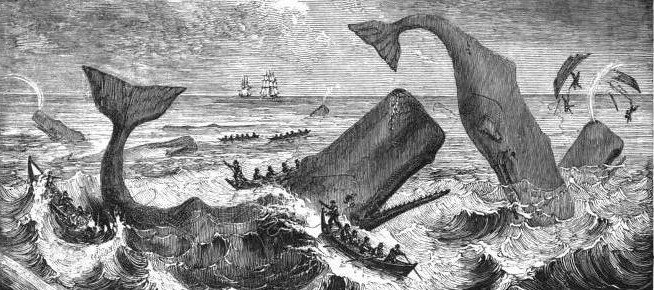Auden, W. H. “The Christian Tragic Hero.” New York Times Book Review (December 16, 1945).
Babcock, C. Merton. “The Language of Melville’s Isolatoes.” Western Folklore 10, no. 3, (October 1951).
Barbour, James. “The Composition of Moby-Dick.” On Melville: The Best From American Literature. Louis J. Budd and Edwin Cady, eds.. (Duke University Press, 1988), pp. 203-220.
—————. “The Town-Ho’s Story: Melville’s Original Whale.” ESQ: A Journal of the American Renaissance, 21 (2nd quarter, 1975).”
Baym, Nina. “Melville’s Quarrel with Fiction.” PMLA, 94 (1979), pp. 909-21.
Bell, Millicent. “Pierre Bayle and Moby-Dick.” PMLA, 66 (1951).
Betts, William W. “Moby-Dick: Melville’s Faust.” Lock Haven Bulletin, 1 (1959), pp. 31-34.
Bezanson, Walter. “Moby-Dick: Work of Art.” Moby-Dick Centennial Essays. Tyrus Hillway and Luther S. Mansfield, eds. (Southern Methodist University Press, 1953).
Birrell, Augustine, “The Great White Whale.” The Athenaeum (January 28, 1921), pp. 99-100.
Brotkorb, Paul. Ishmael’s White World: A Phenomenological Reading of Moby-Dick. (Yale University Press, 1965).
Camus, Albert, “Melville: Un Createur de mythes.” Moby-Dick as Doubloon: Essays and Extracts (1851-1970). Hershel Parker and Harrison Hayford, eds. (Norton, 1970).
Cannon, Agnes D. “Melville’s Use of Sea Ballads and Songs.” Western Folklore, 23 (1964), pp. 1-16.
Dew, Marjorie, “Black-Hearted Melville: ‘Geniality’ Reconsidered.” Artful Thunder: Versions of the Romantic Tradition in American Literature in Honor of Howard P. Vincent, ed. Robert J. DeMott and Sanford E. Marovitz (Kent State University Press, 1975).
Douglas, Ann. “Herman Melville and the Revolt Against the Reader.” The Feminization of American Culture. (Alfred A. Knopf, 1977), pp. 289-326.
Eldridge, Herbert G., “‘Careful Disorder’: The Structure of Moby-Dick.” American Literature, 39 (May 1967).
Fieldsend, Andrew. “The Sweet Tongues of Cannibals: The Grotesque Pacific in Moby Dick” Deep South. (Spring 1995).
Firestone, Evan R. “Herman Melville’s Moby-Dick and the Abstract Expressionists.” Arts Magazine, 54 (1980), p. 120.
Friedrich, Gerhard. “A Note on Quakerism and ‘Moby Dick’: Hawthorne’s ‘The Gentle Boy’ as a Possible Source.” Quaker History 54.1 (1965), pp. 94-102.
Gleim, W. S. “A Theory of Moby-Dick.” New England Quarterly, 2 (July 1929), pp. 402-419.
Heflin, Wilson L., “The Source of Ahab’s Lordship Over the Level Loadstone.” American Literature, 20 (1948), pp. 323-27.
Heimert, Alan, “Moby-Dick and American Political Symbolism.” American Quarterly, vol. 15 (Winter 1963).
Howard, Leon. “Melville’s Struggle with the Angel.” Modern Language Quarterly, 1 (June 1940), pp. 195-206.
Jaffé, David. “Some Origins of Moby-Dick: New Finds in an Old Source.” American Literature, 29.3 (November 1957), pp. 263-277.
Kaplan, Sidney. “Herman Melville and the American National Sin.” Journal of Negro History, 41 (October 1956), pp. 311-38.
Kazin, Alfred. “Ishmael and Ahab: An Introduction to Moby Dick.” Introduction to Houghton Mifflin ‘Riverside’ edition of Moby-Dick. (1997).
Oates, Joyce Carol. “Moby Dick: An American Book of Wonders” ((Woman) Writer, 1988).
Paul, Sherman. “Melville’s The ‘Town-Ho’s’ Story.” On Melville: The Best From American Literature. Louis J. Budd and Edwin Cady, eds. (Duke University Press, 1988), pp. 40-49.
Pease, Donald E. “National Narratives, Postnational Narration.” MFS Modern Fiction Studies, 43.1 (The Johns Hopkins University Press, March 1997), pp. 1 – 23.
Pommer, Henry F. “Herman Melville and the Wake of the Essex.” American Literature, 20 (November 1948).
Schultz, Elizabeth A. “Re-viewing Melville: The Illustrated Editions.” Melville Society Extracts, 103 (December 1995), pp. 1-18.
Simpson, Eleanor M. “Melville and the Negro: From Typee to ‘Benito Cereno’.” On Melville: The Best From American Literature. Louis J. Budd and Edwin Cady, eds.. (Duke University Press, 1988), pp. 135-54.
Smith, Henry Nash. “The Madness of Ahab.” Democracy and the Novel: Popular Resistance to Classic American Writers. (Oxford University Press, 1978), pp. 35-55.
Stewart, George R. “The Two Moby-Dicks.” American Literature, 25 (January 1954), pp. 417-48.
Strauch, Carl F. “Ishmael: Time and Personality in Moby-Dick.” Studies in the Novel, 1 (Winter 1969).
Van Cromphout, Gustaaf, “Moby-Dick: The Transformation of the Faustian Ethos.” On Melville: The Best From American Literature. Louis J. Budd and Edwin Cady, eds. (Duke University Press, 1988), pp. 238-253.
Vargish, Thomas. “Gnostic Mythos in Moby-Dick.” PMLA, vol. 81 (June 1966).
Watson, E.L. Grant “Moby-Dick.” London Mercury, 3 (December 1920), pp. 180-186.
Woodson, Thomas. “Ahab’s Greatness: Prometheus as Narcissus.” ELH: A Journal of English Literary History, 33 (September 1966).
Wright, Nathalia. “Form as Function in Melville.” PMLA, 67 (1952), pp. 330-40.
